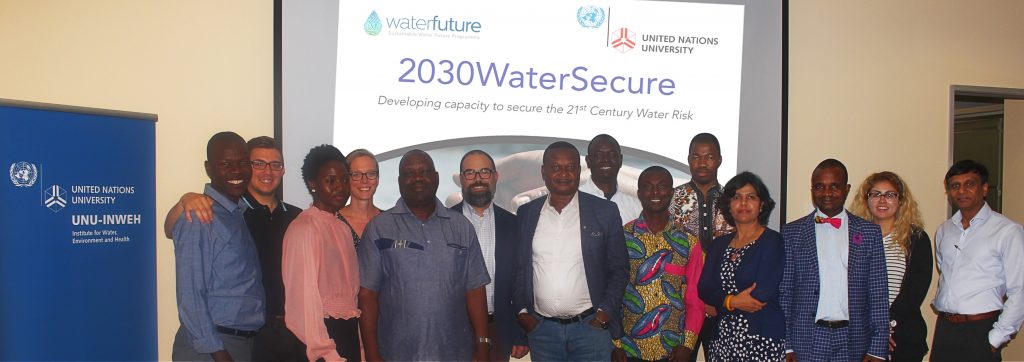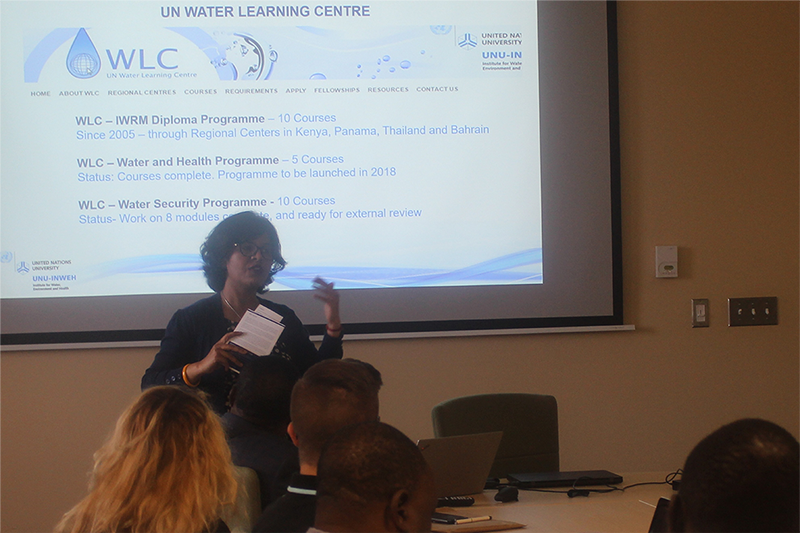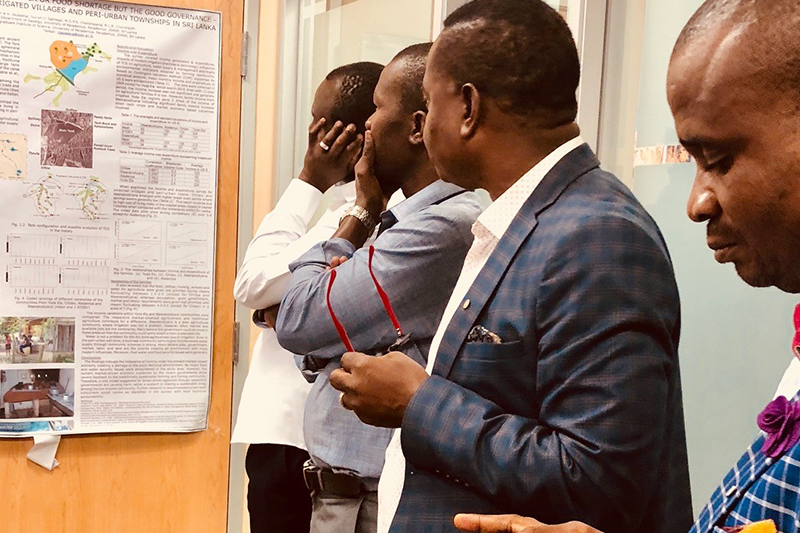AFRICA2030WATERSECURE- CAPACITY GAPS AND NEEDS FOR WATER SECURITY
On 22 June 2018, UNU-INWEH’s ‘Water and Climate Dialogue Series’ organised a one day workshop to jointly map the ‘Africa2030WaterSecure Capacity Gaps and Needs for Water Security’. The collaborative event was organised jointly with McMaster University, ACARE (African Center for Aquatic Research and Education) and Sustainable Water Future Programme of the Future Earth. Africa2030WaterSecure stemmed from 2030WaterSecure, a global and joint initiative of Water Future and United Nations University (UNU-INWEH), 2030WaterSecure is an innovative vision to develop capacity by combining state-of-the-art water knowledge with modern, personalised communication tools in order to tackle the 21st-century water challenges and facilitate effective implementation of the 2030 Water Agenda. It outlines capacity gaps and needs of water security and water-related Sustainable Development Goals (SDGs) and ties closely with the Water Security and Nexus project of UNU-INWEH.

The workshop welcomed multiple stakeholders (12 experts from 7 countries, including -Ghana, Ethiopia, Sudan, Kenya, Cameroon, Nigeria, Malawi…) and several other participants to collectively deliberate a common vision and planning for Africa, mostly in the context of water security and water-related SDGs. (details of agenda and participants here).
The first session opened with introductions followed by a debriefing by the UNU-INWEH Director, Dr Vladimir Smakhtin, outlining the mandate and thematic priorities of UNU-INWEH. This was followed by a presentation by UNU-INWEH Senior Researcher, Dr Hamid Mehmood, on ‘What is the future of e-learning, and where it stands?” Through explanation of MOOCs [Massive Open Online Courses] as an open interface to democratise education through interactive online interfaces, he flagged the focus on utilising the diverse skills of global experts and instruction standards towards the minimised cost of training deployment. Nidhi Nagabhatla, UNU-INWEH Capacity Building Coordinator and Senior Researcher, moderated the session and launched ‘2030WaterSecure’ for the African experts. Dr Nagabhatla explained the multidisciplinary perspective on water-focused sustainable SDGs and water security risks. Moderated multi-stakeholder discussions helped in outlining the capacity demands and mapping feasible options to address those demands towards addressing water risks in the region.

The second part of the session was moderated by Dr Ted Lawrence, Executive Director of ACARE, wherein he explained ACARE’s goal to create a long-term, highly collaborative centre of excellence dedicated to increasing local capacity of African freshwater scientists, managers, scholars, and to the public. ACARE links people together and acknowledges the importance of partnerships while aiming to provide education, support, and training for research and capacity needs in the region. Regarding the challenges to tackle country and place-based needs, Dr Lawrence reemphasised the lack of practical, real-world experiences in policy or field-work as the need for capacity building and focus on the mechanisms to incentivize individuals, while aiming for holistic professional development.

All participants agreed that UNU-INWEH and ACARE could jointly liaise with the region and national agencies to create a living programme ‘2030AfricaWaterSecure’. It was agreed that UNU-INWEH’s experience with the online learning interface, the UN Water Learning Centre (WLC) and access to the UN network towards data, information, and knowledge will provide a competitive edge towards addressing capacity policy gaps and needs for young professionals. Experts from the region, including Mr Kevin Obiero, Mr Alfred Achieng, Dr Friday Njaya, Mr Isaac Nyameke, and others reiterated in their presentations on the vulnerability of freshwater ecosystems in the region, pointing towards various direct and indirect drivers. These include impacts of exploitation, climate change, and overfishing, among others anthropogenic pressures on these resources. The lack of capacity that leads to the next generation of experts is also a significant gap to be addressed. Gaps such as mobilisation of valuable knowledge produced by researchers, knowledge management, and appropriate communication, also persist.
A local expert stated “We still do not have long-term inclusive processes in place for increasing capacity building. There are resource and infrastructure restraints, and curriculum constraints – gaps between the existing system of knowledge dissemination and market needs are wide”.
Excerpts from talks presented by the African Delegation
Mr Obiero’s talk captured the need for capacity building, sharing perspectives and knowledge management, which is aligned with water-related global challenges. He also touched on the various models for bridging knowledge gaps, including social, cultural, linguistic, technological aspects. For example, internet accessibility is a problem for scholars towards knowledge sharing. Mr Nyameke described his experience from Aquaculture and food security nexus in the Great Lakes region of Ghana, including conflict-related with mining. Dr Njaya from Malawi’s discussion captured the scenario of floods and its effect on water quality and subsequent impacts such as conflicts and displacement. Complex issues like population pressure is proving to be a problem for water scarcity, and this is driving migration. How can water-related conflicts resolve? – Sharing his observation that ‘some people resolve conflicts by migrating away from conflict’. Mr Kevin Obiero, from Kenya, outlined how water scarcity is a critical problem in his country, whereby only 11% of Kenya can claim to be water secure and emphasising on the need of sharing knowledge is pivotal in addressing the water-related issue – hence, 2030AfricaWaterSecure can provide a much-needed platform. Highlighting the need to bring these current challenges in the capacity building programmes towards managing and protecting wetlands and water sources was raised repeatedly.
Ms Thelma Zulfawu Abu and Mr Joseph Kangmennaang, doctoral scholars (Geographies of Health in Place, University of Waterloo, Canada) explained their research focusing on WASH for resilient healthcare systems in Kenya. Ms Thelma Zulfawu’s project focuses on improving access to water for domestic use and addressing health impacts from lack of access to water and sanitation, and the challenges faced by marginalised communities. Engagement with local stakeholders and working with local community-based organisations such as COHESU, a well-established non-profit organisation, is the approach adopted for participatory research. Mr Kangmennaang’s presentation focused on water security raised a significant concern, especially at the local level. He also raised a discussion point that it is difficult to convince governments of the value of freshwater resources, so how do we show them the value? – initiating a good discussion on valuation. Mr Bernard Miregwa, doctoral scholar at McMaster University and graduate of the Water Without Borders Programme (WWB), presented snapshots of water crisis, including aspects of health and security in the Congo region, primarily focusing on lack of infrastructure as a limitation and best practices around community-based water management as a strength to ensuring water security.
Towards the conclusion, Dr Anik Bhaduri, Executive Director from Sustainable Water Future (SWF), in his skype address, explained how SWF, a core programme of Future Earth is aiming to equilibrate the human and ecosystem needs to ensure a sustainable “water world” through the provision of solutions that are multidisciplinary. He also explained how the outcomes of the Comprehensive Water Assessment (COMPASS) programme, a core partner in 2030WaterSecure, SWF can facilitate knowledge needs for water security related capacity building- specifically, towards building skills in monitoring threats in real time, up-to-date information collection, imminent, or future water challenges by bringing and building from the experience of the COMPASS programme in Africa.
The closing discussions reiterated the lack of feasible and scalable mechanisms to channel capacity building for water security and water-related sustainable development agenda including e-programmes, courses online similar to what we already have in place; yet, we want them to be engaging and effective. So, having workshops or internships or field work would help attract professionals. Also, there are not as many donors that are willing to fund capacity building programmes, and hence, the need to mobilise this priority and it’s long term benefits remains pertinent. Focus on the use of social media (e.g., Facebook) to conduct online exchange session with the young professionals, to engage them and allow better integration of conventional and modern tools of learning can go a long way in creating impact. Indigenous knowledge – social learnings – are vital and must be incorporated into research practices/methods and education agenda. The roundtable agreed on joint writing proposals for mobilising resources towards collective action on addressing the capacity needs and gaps and that Africa2030WaterSecure can help address some critical problems related to capacity gaps and needs.
Dr Ted Lawrence summarised it as, “this is the beginning of new and innovative opportunities for education. The 2030AfricaWaterSecure programme can serve as the ‘matchmaking’ facility for capacity needs, to bring people together and network.”
Nidhi Nagabhatla
+Notes for the write up contributed by: Mr Cameron Fioret and Ms Panthea Pouramin
The full list of participants is available here.